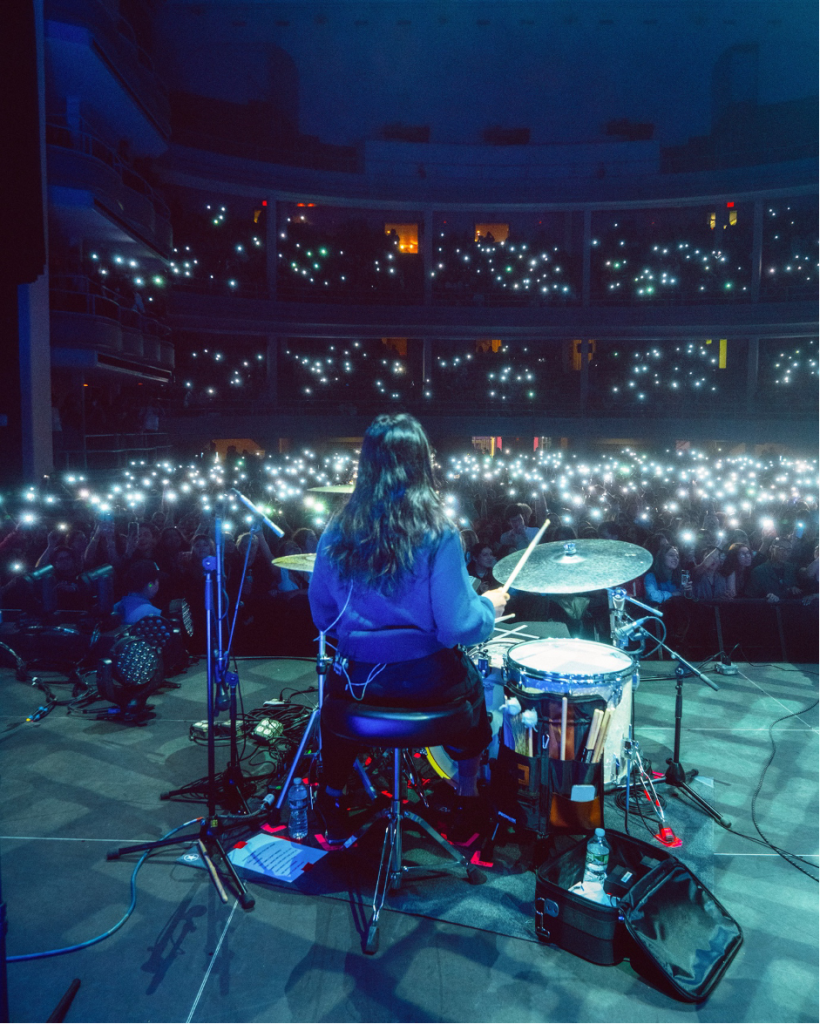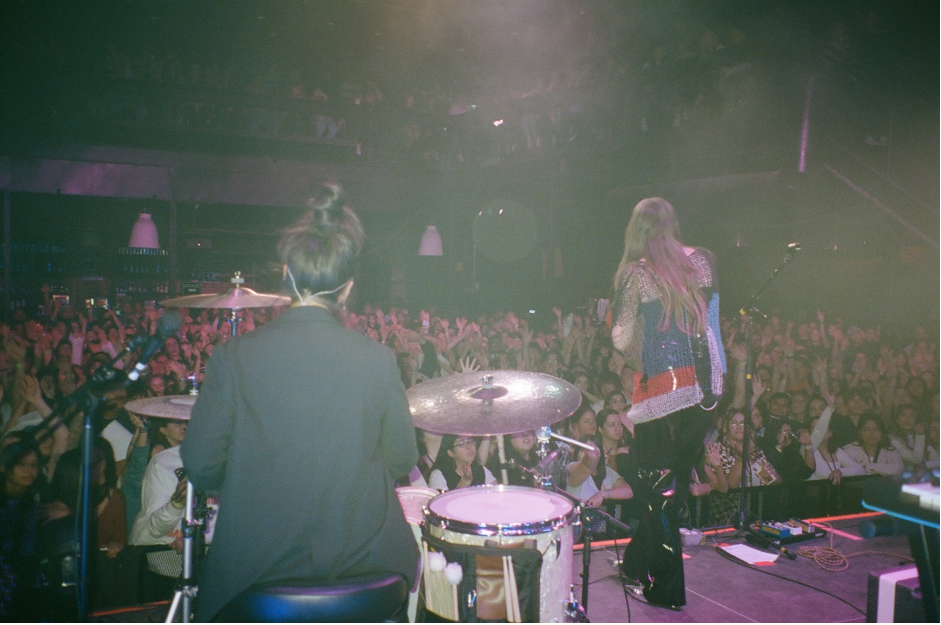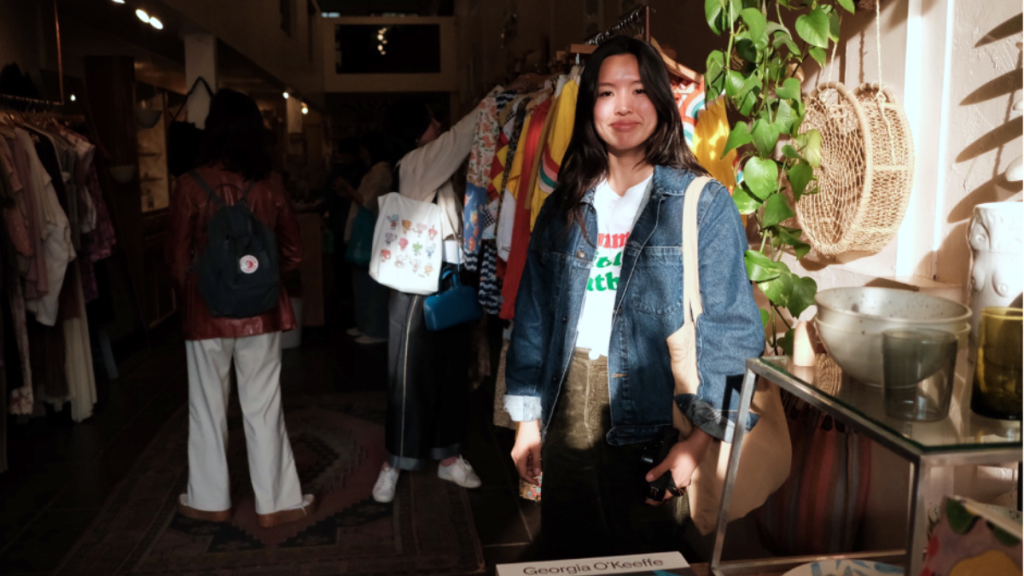Within the pulsating heart of the music industry, Michaela Colet, endearingly referred to as “Mikee,” dances on the lines connecting rhythm and expertise. Her endeavors in music production and live performances transcend the norm, speaking a universal language of dedication and excellence.
When the whispers of Anilee List’s striking performance filled the Tiny Room in Los Angeles, those in the know recognized the familiar beats of Mikee accompanying the singer, celebrating her ascent to the top 24 in American Idol’s 19th season. However, the cozy corners of intimate gigs are just one facet of her versatile repertoire. The vast expanse of the Michigan International Speedway came alive with her prowess when she played for CHARLEY at the 2022 Faster Horses Festival, electrifying an audience of 40,000.
Transcending the stage, Mikee’s finesse in the studio is a blend of intuition and technical prowess. Her work as an Engineer and Production Specialist for Cynthia Erivo’s “Ch. 1 Vs. 1” album showcased this symphony, where tracks like “I Might Be In Love With You” garnered 2.9 million streams on Spotify. Beyond the studio intricacies, Mikee played a pivotal role in the album’s live production dynamics. She was in charge of creating playback tracks and in-ear monitor feeds for the live band using Pro Tools and Elastic Audio. Her job required her to make sure the audio elements were flawless and synchronized perfectly with the live performance. She also had to make sure the performers received accurate in-ear monitor feeds.
Cynthia Erivo’s “Ch. 1 Vs. 1” was more than just an album; it was an amalgamation of elite performances, many of which graced prestigious stages like the Hollywood Bowl, accompanied by the LA Philharmonic. Mikee’s expertise was instrumental in the success of these performances, a testament to her collaborative efforts with Will Wells Productions. As a result, the album’s music was played on prominent TV shows such as the PBS 4th of July Special, Stephen Colbert, The Kelly Clarkson Show, The Today Show, and The Tonight Show, reaching screens across the country. The streaming count for all the tracks surpassed 11 million, thanks to the artist’s careful management and screening of the audio stems to ensure their immaculate condition.
But Mikee’s magic isn’t limited to the recording booth. 2021 saw her at the helm of the house band recording for the prestigious ESPY Awards at Berklee NYC. Using cutting-edge tools like Pro Tools and a Solid State Logic console, she crafted impeccable music cues for the esteemed ESPN Producers, amplifying the grandeur of the ESPN Sports Humanitarian Awards.
Back on the road, Mikee’s rhythms provided the backdrop for Lindsey Lomis on the Joshua Bassett US Headline Tour in 2023 and set the tone for Genevieve Stokes during the 2022 Charlie Burg US Headline Tour.
Yet, amidst all these achievements, her association with the Anti Social Producers Club stands as a testament to her industry standing. Collaborating with titans like Beyoncé, Kanye West, and Anderson Paak, Mikee’s expertise finds resonance among the best.
From arenas to intimate venues, from the recording studio to collaborative ventures, Michaela “Mikee” Colet’s journey weaves a tapestry of relentless passion and unparalleled skill. In the world of music, she’s not just a contributor; she’s a defining force.
We’re really looking forward to hearing more about your work, Mikee. Can you describe your experience working on the ESPYs and Cynthia Erivo’s debut album and how it has influenced your career?
In 2021, I had the privilege of collaborating with the renowned producer, songwriter, musician, band leader, and recording engineer, Will Wells, on two standout projects: Cynthia Erivo’s debut album, “Ch. 1 Vs. 1”, and the ESPN Sports Humanitarian Awards aired on ABC. Serving as his primary Production Specialist, the learning curve was both steep and exhilarating.
The ESPN project whisked me off to New York where I delved deep into the music-making process alongside Will. We dedicated countless hours in the studio, recording a house band that Will frequently associates with. My tasks included capturing the raw essence of their live performances, curating music cues for the ESPN producers, and tweaking various elements to ensure the melodies seamlessly aligned with the dynamics of the awards show. As the event came to life, I found myself immersed in the nitty-gritty, from equipment setups to addressing real-time requirements.
My contributions to “Ch. 1 Vs. 1” were centered around perfecting the live performances. I took the helm in producing playback tracks and in-ear monitor feeds for the live ensemble. This sonic perfection was later magnified on grand stages, like the Hollywood Bowl alongside the LA Philharmonic. Cynthia and her team appeared on various popular TV shows such as Stephen Colbert, The Kelly Clarkson Show, PBS 4th of July Special, The Today Show, and The Tonight Show. As part of the project, their work was also presented on TV screens. Being involved in such a significant project was a dream come true for them.
The duration I spent alongside Will was enlightening, reshaping my understanding of music production. The journey from a mere thought to a symphony requires meticulous planning, profound attention to detail, and a spirit of collaboration. One critical lesson I absorbed was the essence of leadership. It’s not just about guiding a team but also ensuring their well-being, both within and outside the workspace. Navigating challenges, remaining poised under pressure, and handling unexpected obstacles with grace were all leadership nuances I admired in Will.
Even now, as years have rolled by, I often turn to Will, seeking guidance as I tread the dynamic terrains of my musical journey.
What were some of the unique challenges you faced while working on these high-profile projects and how did you overcome them?
I remember one instance during the ESPN recording process in New York, where after a few days sitting at the console desk and operating Pro Tools, I woke up one morning and couldn’t move properly. I noticed that my neck seemed stuck in a position that made it difficult to even sit up. At that point I had started to become more comfortable in the studio and in the workflow with the team, and had been really looking forward to going back in for another productive day’s work, but on this particular day I couldn’t move without pain. I called a doctor and physical therapist who helped me over the phone by explaining how to compromise and try to move and stretch, and also explained what was going on. It turns out that after lifting equipment during load-out of Will’s studio and loading into the recording studio, followed by several days of up to 9 hours sitting at the desk and operating Pro Tools, I had a muscle spasm in my back. I had to call Will and tell him what was going on, and that as much as I wished I could come in on that day, I physically wasn’t able to. His response was incredibly empathetic and understanding, he told me to focus on my health, and that I wouldn’t be letting him or anyone down by doing so. This was something that made an impression on me since I knew how high the stakes were on the project, and every day in that studio was extremely valuable.
During my work on the Cynthia Erivo live performances from Ch. 1 Vs. 1, I produced some playback tracks for the band and organized music stems for rehearsal. I had a lot of questions during this process and had to be honest with myself and with Will, and know that it would be in everyone’s best interest to ask when I needed help instead of prolonging the process by pretending I knew something I didn’t know. On the other hand, the ESPN sessions were actually my very first time running real-life recording sessions in a studio, since I spent much of my Music Production & Engineering major online over Zoom. This is something I didn’t tell Will until the end of the first day, because most things in the studio I was able to figure out how to do – every time Will gave me a keyboard shortcut or a method, I wrote it down on a notepad I had next to me for easy reference the next time he asked me to do something.
I wanted to manage the pressure, take on as much as I could, and be a problem solver to the best of my ability. I think I learned a lot about balancing that with being honest, and how to ask for help, as well as when to try to navigate a new situation without weighing too much on others, or on my colleagues. Will even ended up asking me to type out the contents of my notes into a document for him, which was great!

How did your role in these notable projects differ from your previous work, and what did you learn from these experiences?
Before these projects, I had been in more relaxed and casual collaborative settings, mostly working with people I knew from my more personal life, or through mutual collaborators. This time, on bigger and more professional projects, I felt thrown into a much more fast-paced and high-stakes environment, very much expected to pull my weight and work with certainty. I learned to become very organized and pay extreme attention to detail. Every time something seemed to not be working, I ended up looking back and seeing that I had let a small but necessary thing slip, learning each time that I needed to pay more attention to detail while still working efficiently.
Can you share any memorable moments or breakthroughs during the creation of Cynthia Erivo’s debut album?
I produced material for Cynthia’s live performances to support her album showcases. I had never played live with playback so this was an insight into the process. I honed my skills in Pro Tools, specifically mastering elastic audio and other specialized techniques to craft playback and rehearsal materials. Additionally, I developed a robust system for managing a vast number of stems, ensuring clear communication about my requirements, and streamlining the delivery process. I hadn’t worked with playback before this, and it was a great insight into what a professional performance requires, both technically and musically. I got a better sense of the bigger picture.
How did you approach the production work for such high-profile projects, and what was your strategy for ensuring the best outcome?
These projects helped me to become a lot more organized – keeping track of a lot of audio files, remembering how to handle each part of the process, and working efficiently. I also became a lot more time-conscious and learned to work quickly. I approached the work ready to be a problem-solver and matched the quick pace of my environment while being mindful of details. I began consolidating my observations and commonly employed techniques into a personalized set of standard operating procedures. This approach not only streamlined my process but also allowed me to focus more on the nuances of music and production, eliminating the need to start from ground zero with each new project.
What aspects of your work on these projects are you most proud of and why?
I’m most proud of the quality and musicality at which these projects were produced and the reach they have had with their respective audiences. Participating in projects as monumental as these became a touchstone for the subsequent work I undertook. They set a benchmark for the quality I aspired to achieve, guiding my efforts beyond just those two endeavors with Will.
How have these high-profile projects impacted your reputation within the industry?
Both these projects are highly respected – the ESPN Sports Humanitarian Awards having been broadcast on the ABC network and, of course, representing ESPN and the esteemed awardees and athletes associated with the ceremony. With regard to my work on the performances from Ch. 1 Vs. 1, it was great to be involved in that project, with Cynthia Erivo being an esteemed artist herself, having appeared on the Broadway revival of The Color Purple and the film Harriet. To have worked with the esteemed producers or writers involved with these projects has been a great honor and a great introduction to projects like this in the music industry. I’ve been able to branch out from my work as a musician and contribute valuable work to the world of production, which has been great.

What advice would you give to other musicians or producers who are preparing to work on similar high-stakes projects based on your experiences with the ESPYs and Cynthia Erivo’s album?
When working with other musicians and producers on high-stakes projects like this, I’ve learned to be organized and well-prepared before the project in terms of practice and skill. During the actual project or production, I’ve also learned the value of presence of mind, attention to detail, and clear communication, especially when working a technical skill within music.
It’s also important to continue to listen with a musical ear and pay attention to those details and understand what is going on, since the musicality is at the very center of each project and all the technical work surrounds and supports the music. In such environments, you’re often collaborating with highly skilled professionals who are both exceptionally prepared and incredibly busy. I’ve gleaned the importance of dedicating personal time to honing my skills in preparation for projects. Moreover, becoming an effective team player and attentive listener has been equally vital.




